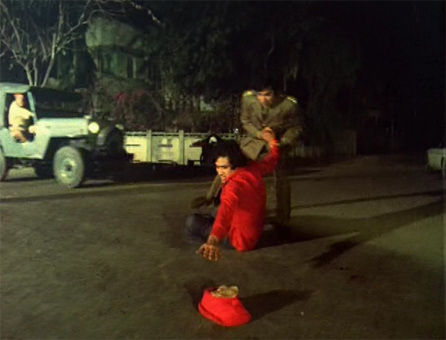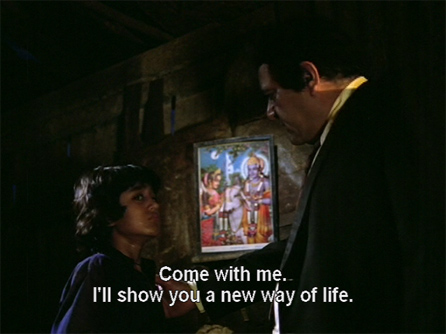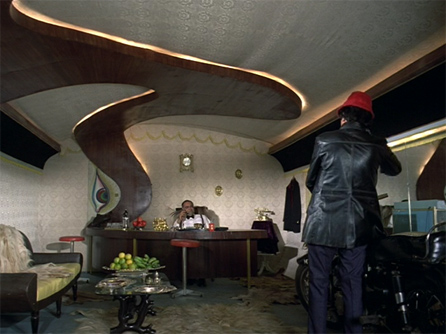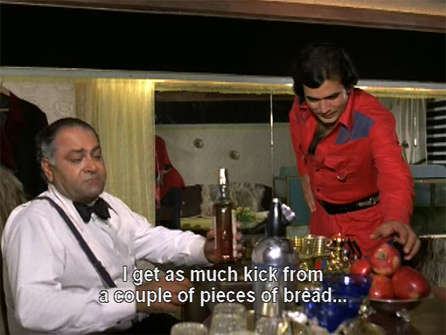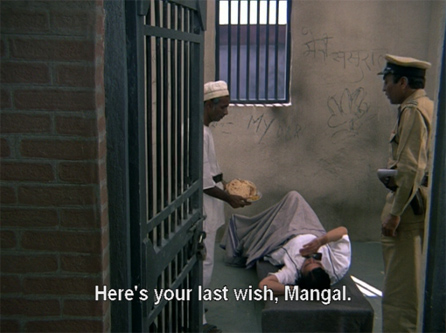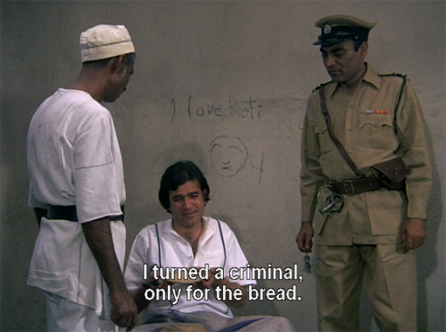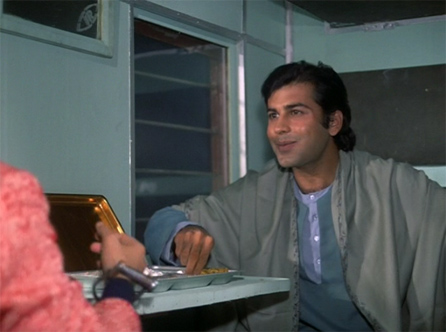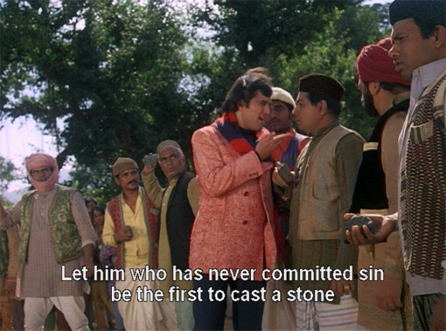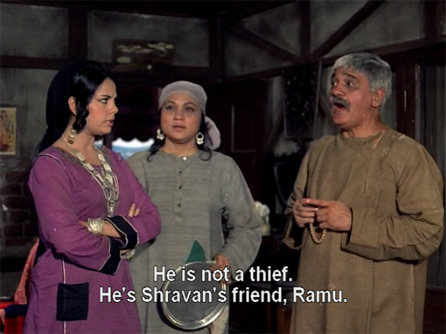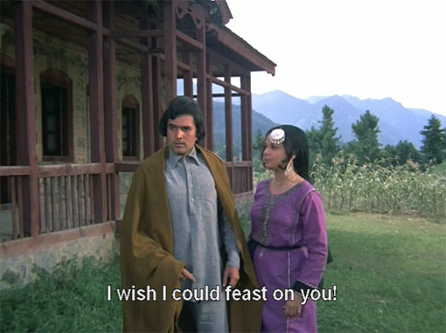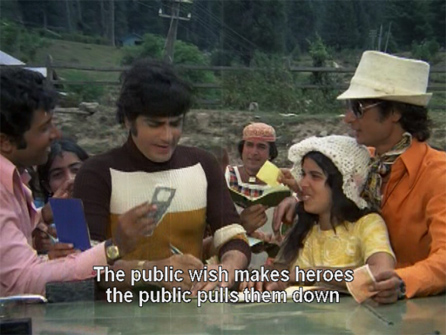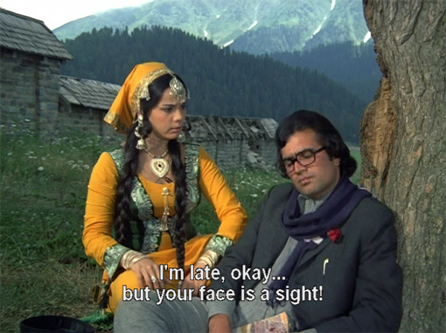Oh my. How do I begin to describe this film? It’s very definitely Manmohan Desai’s work. It has all the usual hallmarks of his stories: poverty, heavy-handed symbolism, religious motifs, good versus evil, sin and redemption. There are parts where ideas are presented so powerfully it takes your breath away. But it’s also filled with the ridiculous: mind-boggling coincidences, over-the-top drama, loony comedy and one plot twist after another.
This film felt larger in scale and ambition to me than any of his others. Fate is a hard task-master here, and Rajesh Khanna gives an excellent performance as its victim, driven by his basic needs but haunted by his wrong-doing.
The story begins in a slum, where young Mangal (Master Ravi) is trying desperately to earn some money to buy bread for his dying mother. He is too small for the work available, and finally in desperation tries to steal some bread from a restaurant. He’s caught, but a rich patron takes charge of him, pays for his bread and takes him home. Alas, it’s too late: his mother has died. This experience takes root as an obsession for Mangal: roti. It’s an obsession for which he will pay, over and over.
The benevolent customer naturally has an ulterior motive.
And so Mangal begins a life of crime, brought up and taught to steal by Suraj (Pinchoo Kapoor). He grows up to be a dashing young man (Rajesh Khanna). We meet him as he’s fleeing by motorbike from the police. He is saved when a truck’s rear door is lowered, enabling him to drive up into it and away. Inside the truck Suraj awaits in his mod mobile lair.
Mangal, though obviously a criminal, does appear to have principles.
He doesn’t drink either (side note: I am soooo in love with that bar cabinet!):
He wants to quit the crime business and open an “eatery” where everybody—rich or poor—can eat together. Suraj has other ideas though; his plan is for Mangal to inherit his business and keep it running. Mangal refuses his offer of dinner, saying that his stomach prefers the simplicity of bread.
At the roti seller’s stand, though, a man (Shyam Kumar) comes up and snatches away Mangal’s roti. They argue, and decide to fight for it. Cue the Sergio Leone music.
A bread duel! In fact, it is actually quite disturbing—it’s so primitive and raw, these fisticuffs over a hand-sized roti. Man reduced to his base self, fighting out of pride and not hunger. It ends when Mangal accidentally stabs his opponent, killing him, and the police arrive and arrest him.
The credits roll against the piece of bread as we listen in on Mangal’s trial. He points out that the poor and hungry often have no recourse except crime; the prosecutor argues that Mangal has been a criminal all his life, and that murder is the worst crime of all. The judge has some sympathy for Mangal, but:
In jail, Mangal has been granted his last request before he is hanged.
The next frame causes me to fall over laughing.
Scrawled on his cell wall: “I love Roti.”
He puts one roti in his pocket for “upar” and walks towards his fate.
Oops. Looks like a cameraman or two are projecting their shadows into the yard. Anyway, as you might expect, it’s not Mangal’s day to die. Suraj sends a helicopter to rescue him—but after a chase during which the police shoot the pilot dead, the helicopter crashes. Luckily, Mangal escapes before the police arrive on the scene, and they assume that he’s been killed.
He gets on a train and follows the smell of roti to a compartment. Its occupant is a nice young man (Vijay Arora) who offers to share his food with Mangal. They are having a nice chat and eating, when the young man notices Mangal’s handcuffs, still hanging on his wrists.
When he tries to pull the emergency chain, Mangal stops him and they scuffle. The fight ends with the young man falling off the train into a river they are crossing on a high bridge. Appalled, Mangal himself jumps off the train on the other side, and finds his way to a blacksmith’s. The blacksmith’s young son cuts the cuffs off and Mangal continues on his way, hopping from bus to bus.
In one town there is a big commotion going on. A young woman is being stoned by the local men for being a dancer, and having loose morals. He goes to her rescue with a song whose lyrics come straight out of the Bible (“Yaar Hamari Baat Suno”).
Chastened, the men slink away and Mangal continues his journey. The scenery is spectacular, I might add; the movie was shot mostly in Kashmir and it’s beautiful. He ends up in a small town where he meets a feisty young woman named Bijlee (Mumtaz) when he tries to steal some bread from her small restaurant.
He also meets a blind couple (Om Prakash and Nirupa Roy), who mistake him for a friend of their son’s and take him in.
They are expecting Shravan to arrive shortly to take up a job as schoolteacher in the local school.
The police have been called to investigate the disappearance of the passenger from the train. They find the missing man’s papers and his luggage on the train.
Nooo! There is no sign of a body, though. When they identify Mangal’s fingerprints at the scene, they realize that he isn’t dead after all. The police surmise (correctly) that the missing passenger must have recognized him, and that Mangal killed him to keep him quiet.
Meanwhile, Mangal takes on a local moneylender (Jeevan) and his thugs who are trying to browbeat Shravan’s parents into giving up their house. He wants to build a hotel on the site.
Mangal kicks them out, endearing himself further to the old couple and enchanting Bijlee, who takes care of them in her spare time.
This moneylender has turned nasty and bitter after his only daughter was lost at a fair years ago. He is also hoarding grain, which Mangal discovers on his way home one day. He sees the moneylender’s men hiding sacks of it underneath a haystack, and leads the townspeople to it while singing another great song “Yeh Public Hai” which extols the power of the masses:
Jeetendra makes a special appearance as himself during the song too!
Bijlee has been chasing after Mangal for some days, and wins him over with yet another lovely song, “Gore Rang Pe.” Rajesh Khanna and Mumtaz have such great chemistry, it’s no wonder they were such a hit pair.
Mangal is happy for the first time in his life. He’s finally going straight, has found parents and the love of his life, and is helping people rather than stealing from them. When Shravan fails to appear, he reluctantly takes the teaching job as well (his own education was somewhat lacking; his answer to “Who was Akbar?” is “Prithviraj Kapoor!”).
But the police are tracking him doggedly, and they also come to town to tell Shravan’s parents that their son is dead. Mangal’s former employer Suraj is closing in on him too—he wants revenge because Mangal did not return to him after escaping the noose. Bijlee’s nephew comes to stay with her, and he is that same blacksmith’s son who cut off Mangal’s handcuffs.
Who will find Mangal first, the police or Suraj? Will Bijlee discover the truth about her beloved? What will Shravan’s parents do when they realize they have been harboring their son’s killer? What will Mangal do when he discovers that the man on the train was their son? Can he find redemption, or will fate deal him more cruel blows? (And, will the moneylender ever find the daughter he lost at the fair?)
I will tell you this: there are some pretty grim moments in this story. It’s compelling! Mumtaz is delicious as the fierce beedi-smoking Bijlee, and as I’ve said already Rajesh Khanna is superb as ill-fated Mangal. The songs by Laxmikant Pyarelal are wonderful, and the supporting cast is impressive too. But the mix of masala craziness and overwhelming sadness didn’t always work for me. I wish there had been more care taken with the script: fewer plot holes and a more cohesive story. I do recommend the film, though, especially if you are a Manmohan Desai fan. I’d love to hear what other people think of it!
